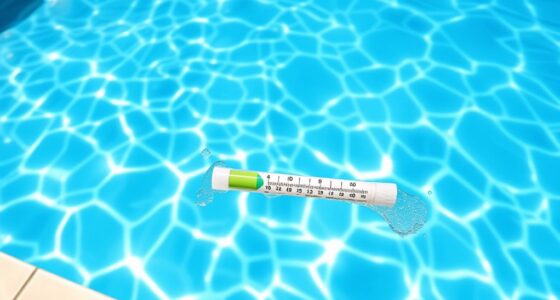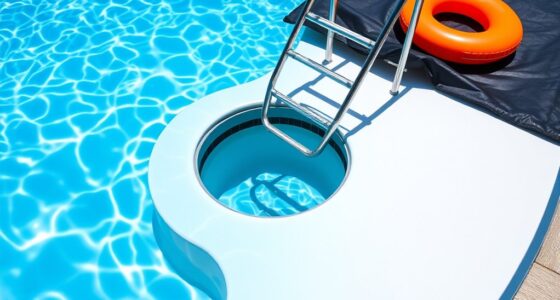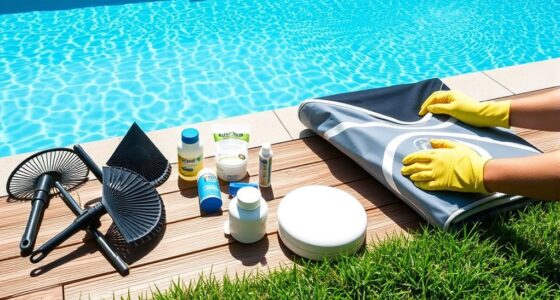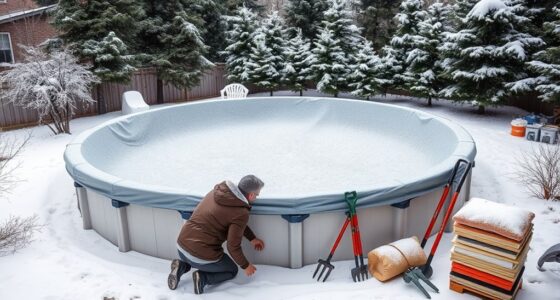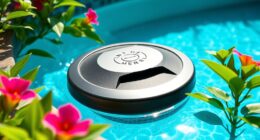Pool heaters come in gas, electric, and solar options, each with unique ways to warm your water. Gas heaters burn fuel to quickly heat the water and are great for colder climates. Electric heat pumps use electricity to extract heat from the air, offering efficiency. Solar heaters harness sunlight through panels to warm your pool naturally. Understanding how each works helps you choose the best system—keep exploring to learn more details about their operation.
Key Takeaways
- Gas pool heaters burn fuel to produce quick, high heat, ideal for colder climates and rapid warming.
- Electric heat pumps extract heat from the air using a compressor, offering energy-efficient pool heating.
- Solar pool heaters use solar panels to harness sunlight, providing eco-friendly and cost-effective water heating.
- Proper thermostat settings and maintenance optimize each heater’s efficiency and reduce energy costs.
- Heater operation varies: gas heaters combust fuel, electric pumps transfer ambient heat, and solar panels collect solar energy.

Understanding how pool heaters work can help you keep your swimming pool comfortable all season long. Whether you’re using a gas, electric, or solar heater, knowing how these systems operate allows you to optimize their performance and save on energy costs. One of the key factors in managing your pool heater is adjusting the thermostat settings. By setting the thermostat to an appropriate temperature—typically between 78 and 82 degrees Fahrenheit—you ensure your pool stays inviting without wasting unnecessary energy. Proper thermostat management is especially important when considering fuel efficiency, as setting it too high can lead to excessive energy consumption and higher utility bills. Conversely, setting it too low might compromise comfort and discourage frequent use.
Adjusting your pool thermostat between 78-82°F optimizes comfort and energy efficiency.
Gas pool heaters are popular because they heat water quickly and are effective in colder climates. They work by burning natural gas or propane to generate heat. When you turn on a gas heater, a combustion chamber ignites, warming a heat exchanger through which pool water circulates. The heated water then returns to the pool, raising the overall temperature. While gas heaters are effective, their fuel efficiency can vary. Regular maintenance, like cleaning filters and inspecting burners, helps maximize efficiency. Also, using the heater only when needed, rather than running it continuously, conserves fuel and reduces costs.
Electric heat pumps, on the other hand, operate by extracting heat from the surrounding air and transferring it to your pool water. They are highly fuel-efficient, especially in moderate climates, because they don’t generate heat through combustion but instead use electricity to power a compressor and fan system. By adjusting the thermostat settings appropriately, you can optimize the heat pump’s efficiency. Many models come with digital controls that allow you to set a desired temperature precisely, and some even have timers or smart features to operate only when necessary. This way, you minimize energy use without sacrificing comfort. Additionally, maintaining proper circulation is essential for maximizing the efficiency of all types of pool heaters.
Solar pool heaters harness the sun’s energy using panels installed on your roof or nearby surfaces. They’re the most eco-friendly and cost-effective over the long term, since they use free solar power. Solar systems typically include a controller that regulates water flow through the panels when sunlight is available, effectively heating the water before it circulates back into your pool. While solar heaters rely on weather conditions, you can still improve their efficiency by maintaining proper flow rates and ensuring the panels are clean and unobstructed. Although solar heaters don’t have thermostat settings in the traditional sense, setting your pool’s temperature appropriately and ensuring your pool’s circulation system is optimized will help you get the most out of your solar heater.
In the end, understanding your heater’s operation and adjusting thermostat settings accordingly can considerably enhance fuel efficiency and keep your pool at a perfect temperature all season long.
Frequently Asked Questions
How Long Does It Take to Heat a Pool With Different Heaters?
It typically takes a few hours to a day to heat your pool, depending on the heater type. Gas heaters warm water quickly, often within a few hours, making them ideal for rapid heating. Electric heaters are slower, taking up to 24 hours. Solar heaters depend heavily on weather; sunny days heat faster, while cloudy weather slows heating. Weather impact considerably influences heating speed across all options.
What Maintenance Is Required for Each Type of Pool Heater?
Ever wondered what it takes to keep your pool heater running smoothly? You’ll need to regularly check and clean filters, inspect for leaks, and verify proper operation. Gas heaters require annual venting checks, electric heaters need electrical inspections, and solar systems benefit from cleaning solar panels. Proper maintenance extends your pool heater’s lifespan and considers installation considerations. Doesn’t it make sense to keep up with these simple tasks for reliable, long-lasting warmth?
Are Solar Pool Heaters Effective in Colder Climates?
Solar pool heaters can be effective in colder climates, but their efficiency depends on climate impact and solar efficiency. In areas with limited sunlight or colder temperatures, they may provide less heat, requiring backup heating sources. To maximize performance, you should consider proper installation, a well-insulated pool, and possibly a hybrid system. While they can work in colder climates, their effectiveness varies based on local weather conditions and solar exposure.
How Energy-Efficient Are Gas, Electric, and Solar Pool Heaters?
Think of your pool heater as a wise gardener choosing plants. Gas heaters are like fast-growing flowers—powerful but less efficient and costly to run. Electric heaters are steady but can consume a lot of energy, impacting your bills. Solar heaters are the eco-friendly vine, most efficient and cost-effective long-term, but installation considerations like roof space matter. Overall, solar offers the best energy efficiency, with lower ongoing costs.
Can Multiple Types of Pool Heaters Be Used Together?
Yes, you can use multiple pool heater combinations to optimize heating efficiency. Hybrid heating systems combine gas, electric, and solar heaters, allowing you to switch between or use them simultaneously based on your needs and energy costs. This setup maximizes energy savings and extends your swimming season. By integrating different types, you enjoy reliable heating regardless of weather conditions, ensuring your pool remains comfortable year-round.
Conclusion
Now that you know how each pool heater works—from gas to electric to solar—you’re equipped to choose the perfect one for your needs. Think of your pool as a garden that needs just the right sunshine or breeze to bloom. Whether you prefer the instant warmth of electric, the powerful heat of gas, or the eco-friendly glow of solar, your ideal heater is out there, ready to turn your backyard into a year-round paradise.


